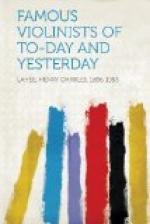Spohr was a most methodical man, and had no appreciation for wild genius. He saw only the many faults of the self-taught youth, and coldly advised him to give up his idea of a musical career, declining to accept him as a pupil. Some five years later, Bull having in the meantime refused to accept this advice, which did not coincide with his own inclinations, Spohr heard him play, and wrote thus of him: “His wonderful playing and sureness of his left hand are worthy of the highest admiration, but, unfortunately, like Paganini, he sacrifices what is artistic to something that is not quite suitable to the noble instrument. His tone, too, is bad, and since he prefers a bridge that is quite plain, he can use A and D strings only in the lower positions, and even then pianissimo. This renders his playing (when he does not let himself loose with some of his own pieces) monotonous in the extreme. We noticed this particularly in two Mozart quartets he played at my house. Otherwise he plays with a good deal of feeling, but without refined taste.”
After his discouraging interview with Spohr, Ole Bull returned to Norway, making, on the way, a short visit to Goettingen, where he became involved in a duel.
Feeling that his own capabilities were worth nothing, after what he had seen and heard in Germany, Ole Bull returned home in a despondent state of mind, but, on passing through a town where he had once led the theatre orchestra, he was recognised, welcomed, and compelled to direct a performance, and thus he once more fell under the influence of music, and began to apply himself vigorously to improvement.
In 1831 he went to Paris in order to hear Paganini, and if possible to find some opportunity to improve himself. He failed to enter the Conservatoire, but he succeeded in hearing Paganini, and this, according to his own account, was the turning-point of his life. Paganini’s playing made an immense impression on him, and he threw himself with the greatest ardour into his technical studies, in order that he might emulate the feats performed by the great Italian.
His stay in Paris was full of adventure. He was hampered by poverty, and frequently in the depths of despair. At one time he is said to have attempted suicide by drowning in the Seine. There is also a story told to the effect that the notorious detective, Vidocq, who lived in the same house with him, and knew something of his circumstances, prevailed upon him to risk five francs in a gambling saloon. Vidocq stood by and watched the game, and Ole Bull came away the winner of eight hundred francs, presumably because the detective was known, and the proprietors of the saloon considered discretion to be the better part of valour. It was a delicate method of making the young man a present in a time of difficulty, but one of which the moral effect could hardly fail to be injurious.
At one time, when he was ill and homeless, he entered a house in the Rue des Martyrs in which there were rooms to let. He was received and treated kindly, and was nursed through a long illness by the landlady and her granddaughter.




